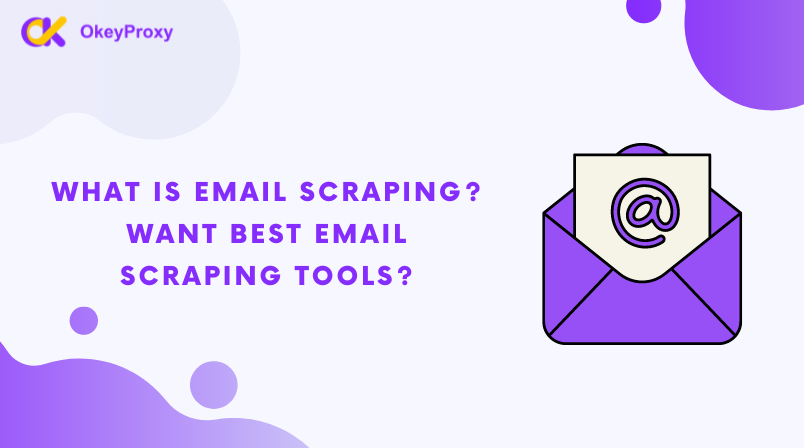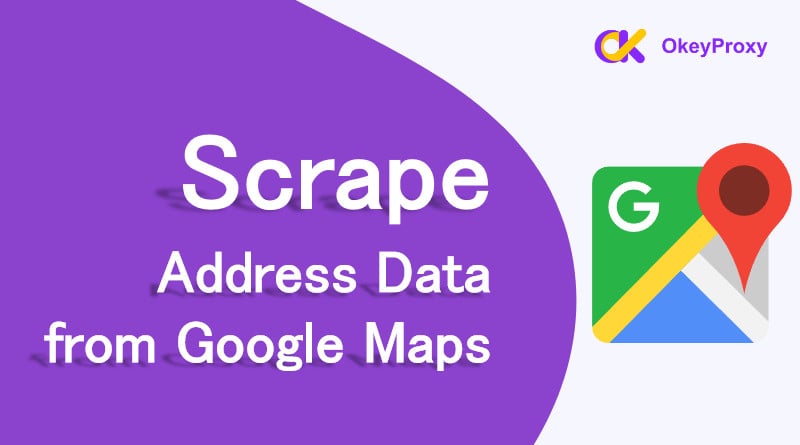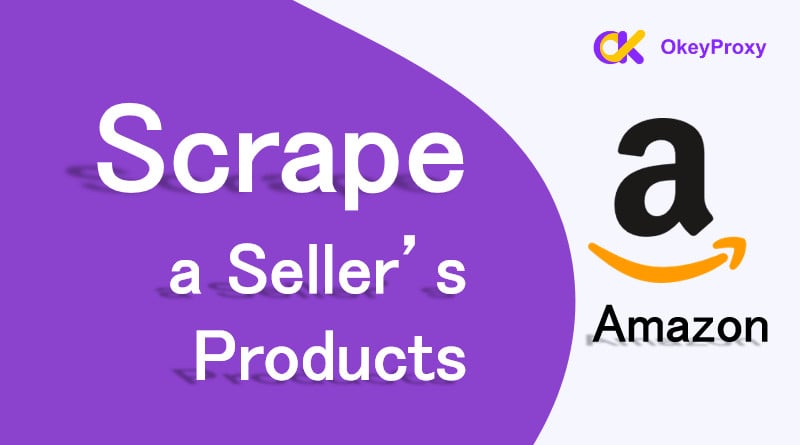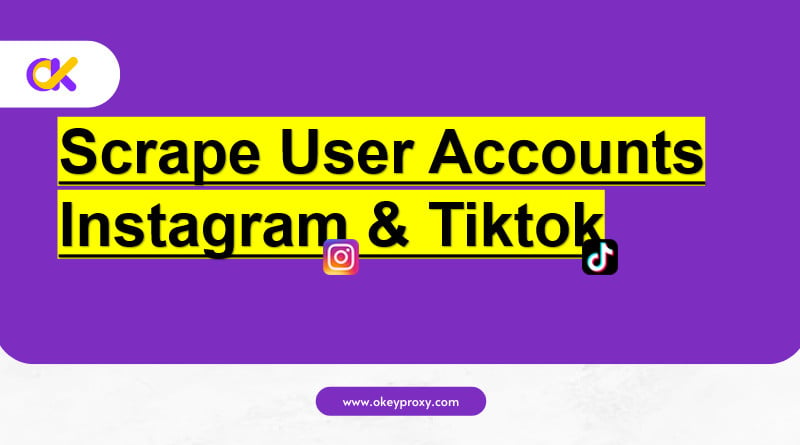Want to collect precise and current emails from diverse sources? Email scraping enables you to extract email addresses from corporate websites and social media platforms.
This article discusses all aspects of email scraping service. You must be curious about what is email scraping. Is email scraping legal? More importantly, we share the free and best email scraping tools.
What is Email Scraping?
Email scraping is the process designed to extract email addresses from websites, documents, or other online sources using automated scraping tools or scripts. There are general scrapers suitable for almost any site and specialized scrapers tailored for specific platforms. For instance, dedicated email scraper software is optimized for scraping LinkedIn emails, while other scrapers are used for platforms like eBay.
This technique is often used for various purposes, such as marketing, lead generation, and data collection, etc.
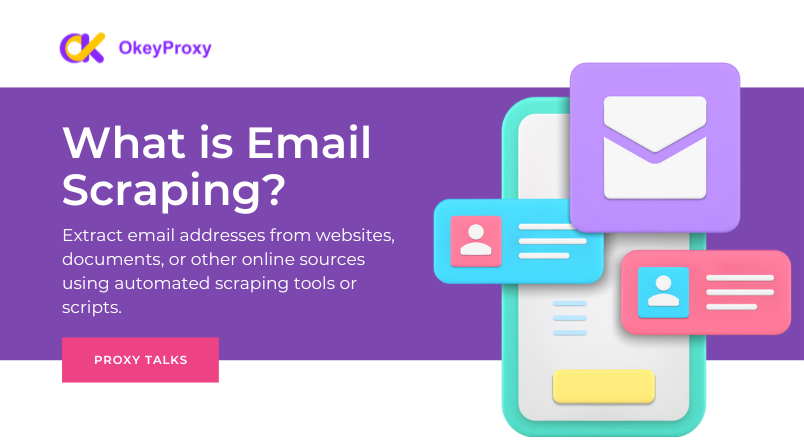
Is Email Scraping Legal?
Before diving into the details, it’s crucial to understand the legal aspects of email scraping.
Before initiating the process, you might be grappling with certain questions. Broadly, the response is affirmative. The majority of email scrapers solely retrieve publicly accessible email information from a webpage. In a way, they’re simplifying the copy-paste process for you. Nevertheless, if certain websites enforce privacy regulations on email scraping, it’s imperative to respect these guidelines. Compliance with local data privacy laws is also a must. Having absorbed this information, you’re now well-equipped with a solid understanding of it.
How Does Email Scraping Work?
It parses the HTML of a website, targeting all forms of content that are displayed or publicly accessible. The primary focus is to identify and extract email addresses. Once the emails are extracted, they are compiled into a lead database, which you can then integrate into your email list. Some email scraper tools require downloading, while others are as user-friendly as a browser extension.
Various strategies can be employed to gather email addresses, including both manual or automated approaches, as well as a combination of the two. We will focus on illustrating the common automated techniques utilized for mass email searches and the scraping of email data information.
1. Email scraping tools: Automated tools for email scraping can be employed to extract email addresses efficiently. Depending on various factors such as specific requirements, resources, and technical expertise, you can choose to either build an email scraper internally or outsource it. Using an in-house web scraper allows for customization to fit your exact data collection needs. However, creating your email scraper requires technical capabilities and resources, including the time and effort required for its upkeep and enhancement.
2. Regular Expressions (Regex): Regular expressions are patterns used to match character combinations in strings. They are particularly useful for identifying email addresses within text. A simple regex pattern for matching email addresses might look like this:
[a-zA-Z0-9._%+-]+@[a-zA-Z0-9.-]+.[a-zA-Z]{2,}
This pattern searches for sequences that resemble email addresses, making it a fundamental tool in email scraping.
3. Web scraping APIs: Some websites provide APIs that can be used to access data programmatically. Web scraping APIs (Application Programming Interfaces) are specialized tools that offer a quite efficient method for collecting email addresses. They are particularly useful for users who may not possess extensive programming abilities or resources to create custom email scraping tools. Not all APIs provide email addresses directly, but they can still be a valuable resource for gathering related information.
4. Custom Scripts: For more complex scraping tasks, custom scripts can be written to navigate websites, handle pagination, and extract email addresses. Tools like Selenium can be used to automate web browsers, making it possible to scrape dynamic content that requires user interaction.
Challenges in Email Scraping
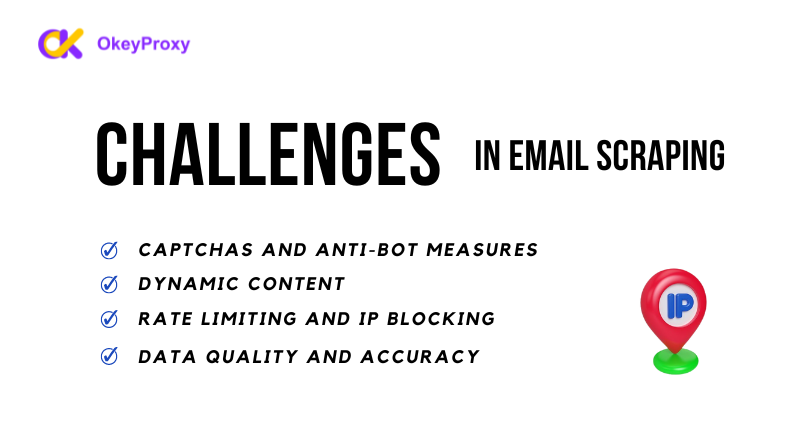
1. CAPTCHAs and Anti-Bot Measures
Many websites employ CAPTCHAs and other anti-bot measures to prevent automated scraping. These can be challenging to bypass and often require sophisticated techniques, such as machine learning models, to solve CAPTCHAs.
2. Dynamic Content
Websites that use JavaScript to load content dynamically can be difficult to scrape using traditional methods. Tools like Selenium or Puppeteer can be used to render JavaScript and extract the desired data.
3. Rate Limiting and IP Blocking
Websites may implement rate limiting to restrict the number of requests from a single IP address. To overcome this, scrapers often use proxy servers to distribute requests across multiple IP addresses.
4. Data Quality and Accuracy
Extracted email addresses may not always be accurate or valid. It’s essential to implement validation checks to ensure the quality of the collected data.
How To Solve Rate Limiting and IP Blocking of Email Scraping?
Rate limiting and IP blocking are common challenges faced when performing email scraping. Websites usually apply these measures to prevent abuse and protect their resources. Using Proxies is an effective strategy that you can use to mitigate these issues while ensuring your scraping activities remain ethical and legal. Here’s why you should use the dedicated scraping proxy provider OkeyProxy to solve rate limiting and IP blocking with proxies:
Proxies help to distribute the load and avoid rate limiting and IP blocking.
Here are the main types of proxies you could use:
Residential Proxies: These are IP addresses assigned to real residential users. They are less likely to be detected and blocked than data center proxies.
Data Center Proxies: These are IP addresses provided by data centers. They are cheaper but more likely to be detected and blocked.
Rotating Proxies: These proxies automatically change the IP address after a certain number of requests or a specific time interval.
Best Email Scraping Tools: Free and Paid Email Scrapers
1. Octoparse is a user-friendly email web scraper designed for data collection without the need for coding. One of its primary applications is email scraping from social media platforms and specialized market portals. Upon downloading the software and searching for an ’email scraper’, you’ll discover a pre-built template designed to help users collect email and social profile information from websites. These templates allow you to extract email data from websites with just a few clicks. Alternatively, you can opt for the auto-detect mode and customize the workflow to execute a tailored task, enabling you to extract any data you desire.
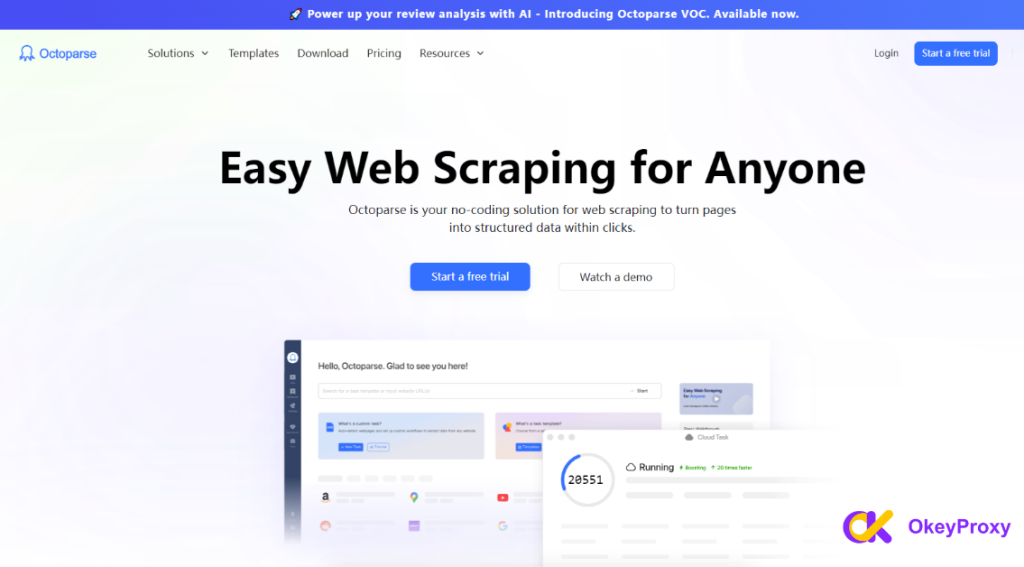
2. LinkedIn provides an all-in-one platform that incorporates website search, domain search, and leads directory. Skrapp.io can identify the business email address linked to a LinkedIn profile. Its user-friendly interface stands out amongst other email scrapers. The pricing ranges from $49 to $299 per month, and the complimentary plan permits up to 150 lookups each month.
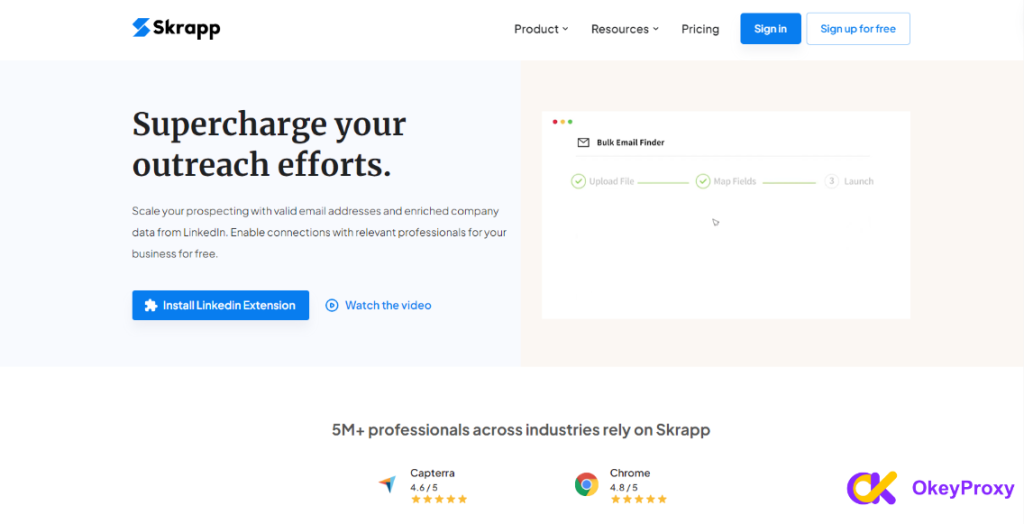
3. Another tool for email prospecting is available, although Rocket Reach is slightly more intricate to operate. It comes with a Chrome extension that can swiftly capture email addresses present on the page. Additionally, their search page can be used to locate contact information. However, the cost per lead is relatively higher. This tool is more suited to larger enterprises like Facebook and Google.
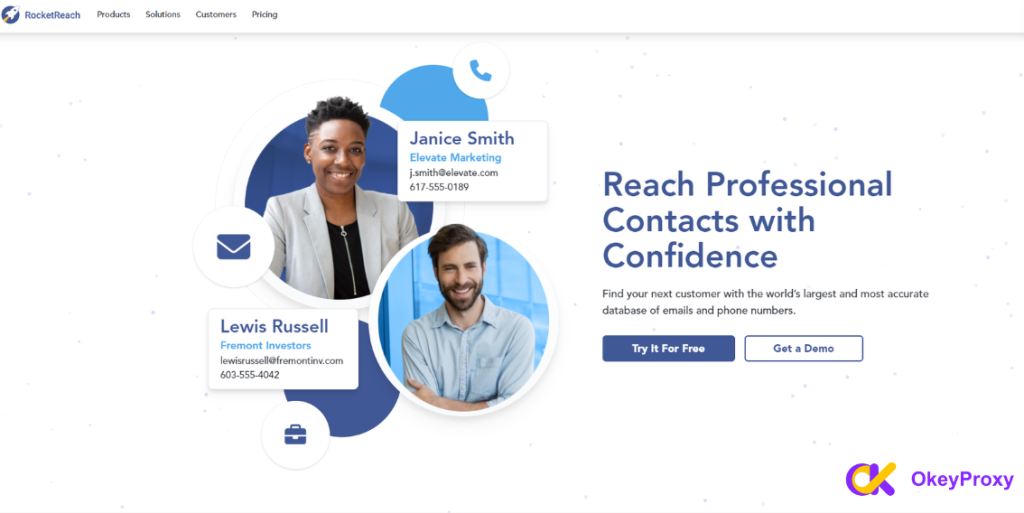
Best Practices for Ethical Email Scraping
1. Transparency: Be transparent about your data collection practices. Inform users about the data you are collecting and the purposes for which it will be used.
2. Permission and Opt-In: Always seek permission before collecting email addresses. Implement opt-in mechanisms to ensure that individuals are aware of and agree to the data collection.
3. Data Security: Protect the collected data by implementing robust security measures. Ensure that email addresses and other personal information are stored securely and are not accessible to unauthorized parties.
4. Compliance: Stay informed about relevant laws and regulations governing data collection and email marketing. Ensure that your practices comply with these legal requirements to avoid potential penalties and legal issues.
How to Expand Your Business with Email Scraping or Other Marketing Strategies?
Are you only concentrating on email scraping? Or should you explore other lead-generation methods? While email scraping can effectively sustain your lead pipelines, it shouldn’t be your sole strategy.
The scraping should complement other approaches, such as inbound sales. Although the act of scraping emails is legal, sending unsolicited emails can be counterproductive. To maximize effectiveness, always provide value, personalize each email, and strive to build genuine relationships with the prospects you’ve identified through email scraping. Combined with other sales enablement strategies, thus email scraping could be a formidable tool in any email marketer’s toolkit.
Conclusion
In summary, email scraping is a powerful tool for extracting email addresses from various online sources, aiding in marketing, lead generation, and data collection. However, it’s essential to understand its legal implications and adhere to ethical practices. While it can be an efficient method for gathering data, it should not be the only strategy employed. It is best used in conjunction with other lead-generation methods. Furthermore, respect for privacy, data security, and compliance with relevant laws are paramount. With the right tools and practices, email scraping can significantly contribute to your marketing efforts.


